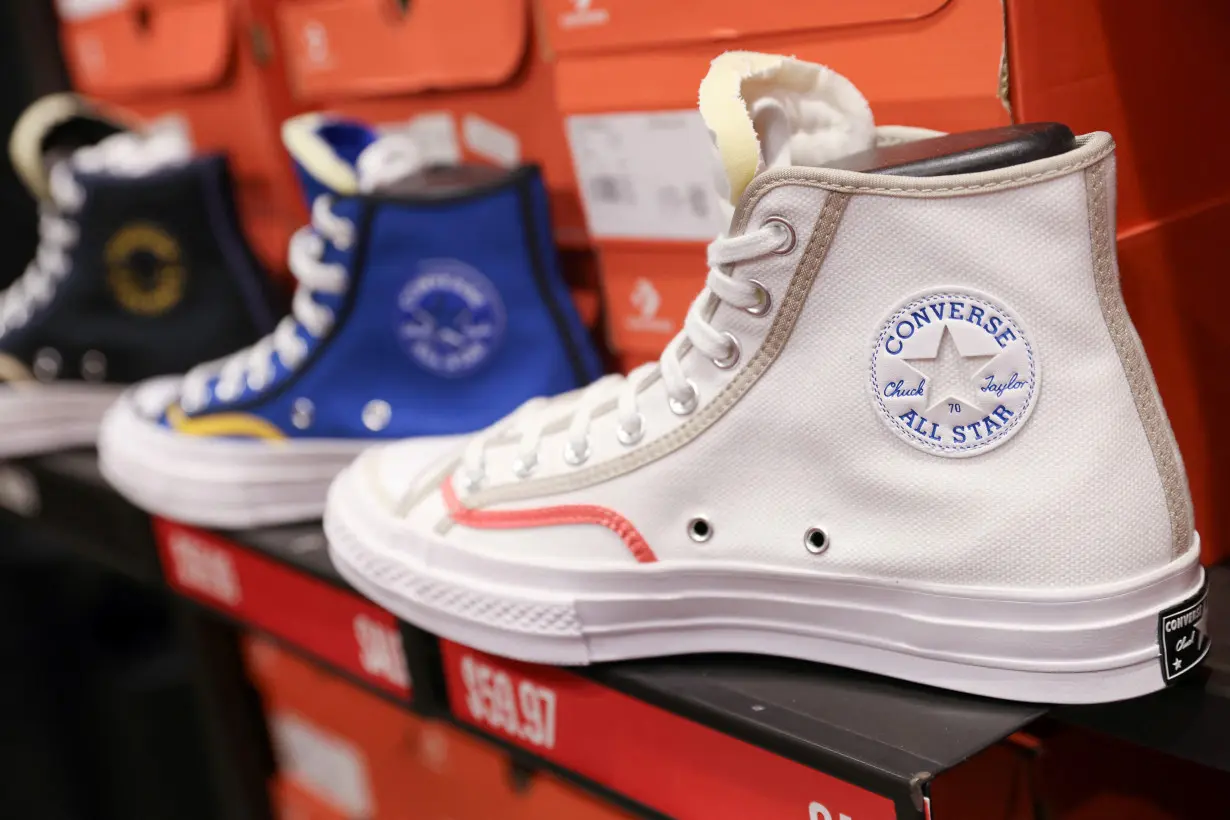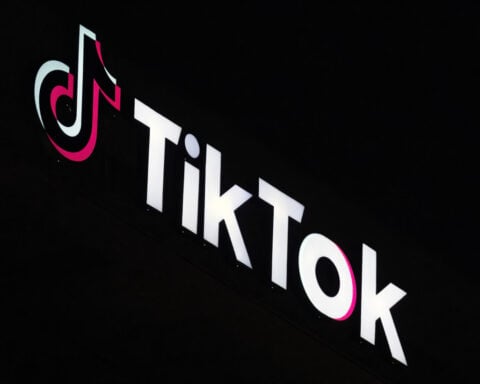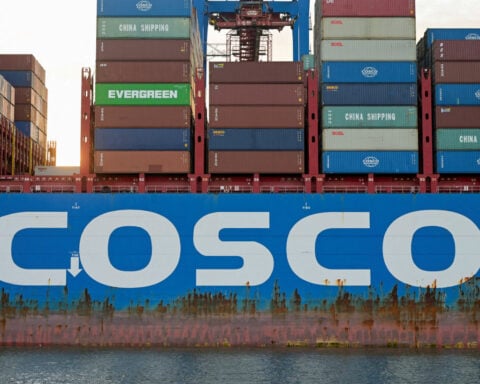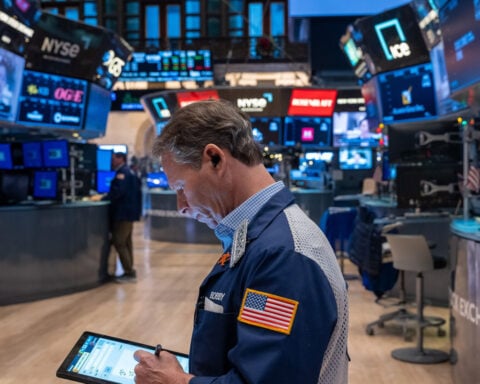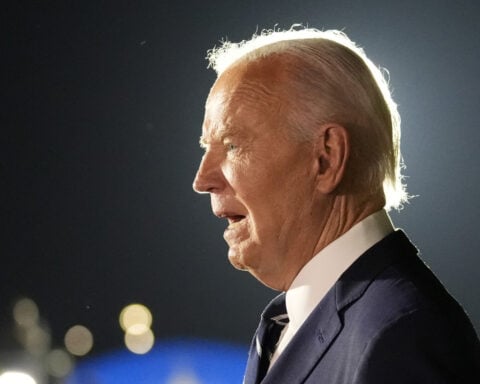By Katherine Masters
NEW YORK (Reuters) - Retailers slashed prices on twice as many Nike sneakers in 2024 than two years earlier, endangering the sportswear giant's typically strong pricing power at a time of stiff competition from rival sneaker brands, according to analytics firm Vertical Knowledge.
Researchers compiled online pricing data from a sampling of eight national chains -- Foot Locker, Dick’s Sporting Goods, Macy’s, among them -- and found that the retailers slashed prices on 44% of their Nike sneakers on average in 2024. That's up from 19.4% during the comparable 2022 period, according to Vertical Knowledge data, which was provided exclusively to Reuters.
The trend marks a break from the past, when Nike retailers enjoyed the ability to sell through their Nike inventory at full price -- particularly lifestyle shoes such as Nike Air Jordan 1 Retro High. Nike's full retail prices range from roughly $50 for basic Nike running shoes to $200 or more for special-release Nike sneakers.
Some retailers' moves to slash prices on Nike sneakers could spell trouble for Nike, the world’s leading sportswear company. “They’re a company that’s been masterful at charging premium prices to the mass market," said Brian Yacktman, president of YCG Investments, which owns Nike shares.
On Wednesday, discounted Nike shoes were on display at a Foot Locker in New York City, where Lebron 20 basketball sneakers were reduced to $129.99 from their original price of $170 and Nike Air Max styles were on sale. At Macy’s flagship store in Herald Square, multiple Nike Air sneakers were also on sale, including the Air VaporMax and Air Huarache.
The average price of Nike sneakers at major retailers like Macy’s fell to $79.92 in early 2024, from $103.61 in the first quarter of 2022, according to the data. According to Nike's most recent annual report, Nike sells its products wholesale to "thousands of retail accounts."
A Nike spokesperson said Nike has “a very diversified wholesale portfolio, with no single partner representing an outsized portion of total wholesale revenue."
Dick’s Sporting Goods did not respond to a request for comment, while Foot Locker and Macy’s declined to comment.
The same eight major retail chains are selling sneakers by both On Running and Deckers-owned Hoka-- two fast-growing Nike rivals thanks to their focus on cushioned running shoes -- for about $148 per pair on average, the data show.
Nike investor Yacktman said in a recent interview that discounts are concerning. “The thing I’m laser focused on with Nike is when they’re going to quit the promotional pricing and get back down to brass tacks." His firm also owns shares Amazon and LVMH.
After pulling back from some wholesale distributors two years ago to focus on direct-to-consumer sales, Nike announced in June it would return to retailers such as Designer Brands -owned DSW -- a sign that those chains are still an important way for Nike to reach shoppers.
'STUFFING THE MARKET'
Nike surprised investors in late December by cutting its annual sales forecast for 2024. At the time, Chief Financial Officer Matthew Friend said the company was grappling with a "highly promotional marketplace," particularly in its online business, and would step up plans to reduce the supply of "key franchises" amid uncertain consumer demand.
Nike has long marketed its shoes as sought-after, premium products. In December, Friend also told investors that Nike's gross margins would expand this year in part because of "strategic" price increases.
But footwear industry analyst Matt Powell said Nike has been “stuffing the market” with topsellers like its retro lifestyle sneakers and iterations of its Jordan brand, releasing too many styles to retailers despite signs that shoppers have grown weary of Nike shoes.
The sample of eight retailers whose pricing Vertical Knowledge tracked sold far more Nike sneakers at a discount than they did Hoka sneakers (4.5%), Adidas shoes (18.9%), Switzerland-based ON Running shoes (23.1%) or Puma styles (37.4%), the data show.
Discounting could damage Nike's allure for consumers. If shoppers see more frequent price cuts on Nike styles, "Nike runs the risk of just becoming another shoe brand" in their eyes, Powell said.
Another sign of waning shopper demand: Nike styles, including Nike Dunk Low Retro have also sunk in price on the sneaker resale marketplace. In 2023, Nike released 116 new versions of the shoe, compared to 31 in 2019, according to Dylan Dittrich, head of research for Altan Insights, which studies the collectible sneaker market.
At the end of 2021, some releases of the shoe sold for up to $340 on resale platforms like StockX -- nearly triple Nike's retail price of $115. But most Dunk Low styles are now available for close to, or less than, the original list price.
(Reporting by Katherine Masters; Editing by Aurora Ellis)

 Who is Joseph Aoun, a low-profile army chief who is now Lebanon's president?
Who is Joseph Aoun, a low-profile army chief who is now Lebanon's president?
 Children who vanished after mother found dead still missing 6 months later
Children who vanished after mother found dead still missing 6 months later
 Dow tumbles more than 500 points following blowout jobs report
Dow tumbles more than 500 points following blowout jobs report
 Biden levies new sanctions against Russian energy sector, but it's up to Trump whether to keep them
Biden levies new sanctions against Russian energy sector, but it's up to Trump whether to keep them
 Biden admin imposes harsh sanctions on Russian oil industry to cut off funding for Ukraine war effort
Biden admin imposes harsh sanctions on Russian oil industry to cut off funding for Ukraine war effort
 For Elton John, 'Never Too Late' isn't just a documentary and song — it is a life mantra
For Elton John, 'Never Too Late' isn't just a documentary and song — it is a life mantra
 United States adds Romania to visa waiver travel program
United States adds Romania to visa waiver travel program
 Former WWE CEO Vince McMahon settles SEC charges over disclosures
Former WWE CEO Vince McMahon settles SEC charges over disclosures
